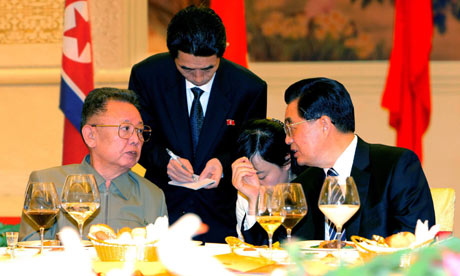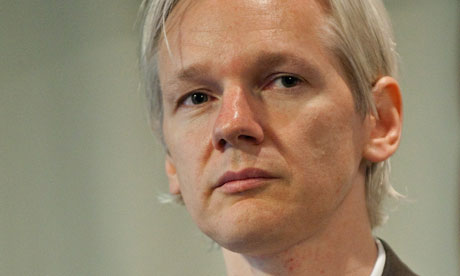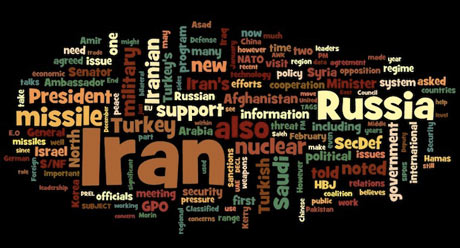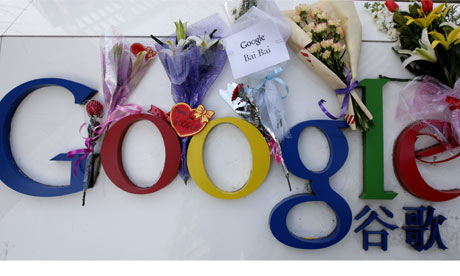WikiLeaks US embassy cables: live updates
• Latest leaks show China ready to abandon North Korea
• Prince Andrew's sweary outbursts at media and French
• Hillary Clinton leads international condemnation of leaks
• Prince Andrew's sweary outbursts at media and French
• Hillary Clinton leads international condemnation of leaks
This page will update automatically every minute: On | Off

9.06pm: The Economist is mildly revising its snotty tone over the value of WikiLeaks. Its blogger MS writes:
I think WikiLeaks is an important organisation that's doing something the world needs. But like other human-rights and humanitarian organisations, such as Human Rights Watch, Amnesty International, Doctors Without Borders and the International Committee of the Red Cross, it needs to lay down some clear, public ethical guidelines about how and why it does what it does. And it needs to bring in a board of directors of people from a wide range of countries, backgrounds and institutions to review the organisation's conduct on ethical and other grounds.Yes, a board of directors. That'll do it.
MS ends by asking: "Who's WikiLeaks? Besides Mr Assange, I don't know, and they're not really telling. Do you know? If so, start a wiki about it." (You mean, like this one?)
 Julian Assange speaks at a press conference in London, September 2010. Photograph: Leon Neal/AFP/Getty Images
Julian Assange speaks at a press conference in London, September 2010. Photograph: Leon Neal/AFP/Getty Images 8.49pm: Time magazine has an interview with the man of the hour, Julian Assange – and promises to post audio soon.
"Speaking over Skype from an undisclosed location on Tuesday," Time reports, "the WikiLeaks founder was replying to a question by Time Managing Editor Richard Stengel over the diplomatic cable dump Assange's organization began loosing on the world over the weekend." So far here's the version Time has posted so far:
Assange said that all the documents were redacted "carefully." "They are all reviewed and they're all redacted either by us or by the newspapers concerned," he said. He added that "we have formally asked the State Department for assistance with that. That request was formally rejected."
Asked what his "moral calculus" is to justify publishing the leaks and whether he considered what he was doing to be "civil disobedience," Assange said, "Not at all. This organization practices civil obedience, that is, we are an organization that tries to make the world more civil and act against abusive organizations that are pushing it in the opposite direction."
8.21pm: The Associated Press reports that the State Department has pulled out the plug between its classified information network and the rest of the government to avoid any more Wikileaking:
Reeling from disclosures of sensitive diplomatic messages, the State Department has disconnected access to its files from the US government's classified computer network. The move dramatically reduces the number of employees inside the government who can see important diplomatic messages.
A State Department spokesman, PJ Crowley, said the decision was temporary, at least until workers correct what he called "weaknesses in the system that have become evident because of this leak."
8.06pm: Perhaps the best piece of media analysis of the US embassy cable release has come from Politico's Keach Hagey, a must-read if you are interested in the nuts and bolts:
Such collaboration by major media organizations across international borders — both in agreeing to work together in publishing the material and in agreeing what material should be kept out — is new for journalism.
"I know of no international efforts like this, a global kind of collaboration," said Mark Feldstein, a professor at George Washington University's School of Media and Public Affairs... "It's unprecedented and to be commended. The volume of the material that WikiLeaks obtained is unprecedented, so to tackle a subject this complicated is going to take more resources. And just as everything else has gone global – crime and multinational corporations – so we are starting to see the beginning of a more global investigative journalism," he said.
7.50pm: In a slight change of pace, the Washington City Paper's Moe Tkacik has been closely following the WikiLeaks saga and is interested in how much US press coverage has been on the issues raised by the content of the leaks, and how much is about the flotsam surrounding it:
But before the latest document dump it appeared that a grand total of three stories, comprising 4108 words of the 35,662 words of 2010 [Washington] Post stories about which Wikileaks was the primary focus, actually required anything approaching a close read of any of the Wikileaked documents.
7.32pm: Those wanting to hear more from the Guardian's David Leigh – such as Prince Andrew – can listen to David's appearance on Democracy Now!, in which he says there's much, much more to come.

7.22pm: Incoming news from the Guardian's David Leigh, with cables showing that American and British diplomats fear Pakistan's nuclear weapons could fall into the hands of terrorists, aided by members of the Pakistan government, or lead to a devastating nuclear exchange with India:
The latest cache of US embassy cables released by WikiLeaks contains warnings that Pakistan is rapidly building its nuclear stockpile despite the country's growing instability and "pending economic catastrophe".
6.53pm: Historian James Mann writes in the New Republic that the US embassy cable leaks won't be the death of diplomacy:
So, while the cables released by Wikileaks will give new meaning to the words "modern history," and, while we now know more than we ever did before about the State Department's recent diplomacy, it's also worth remembering that State Department cables don't contain everything. And, yes, there will still be secrets in the future.
6.34pm: Fast Company gives us a "word cloud" of one tranche of the cables:
 US embassy cables word cloud from Fast Company
US embassy cables word cloud from Fast Company Guess what word is most on the minds of US diplomats in 2010? Yup – Iran. "Iranian" is prominent in the mix too as is "nuclear," which should explain the interest. Fascinatingly "Turkey" is more prominent than "Afghanistan," possibly due to the country's key location in supporting US and Nato operations in both theaters of conflict.

6.20pm: The Guardian's Martin Chulov is in Baghdad and reports from there on the delayed reaction to the US leaks:
After a day's silence, Iraq has just responded to the US embassy cables. The leaks gave the Government a lot to reflect on – especially about the establishment's links to Iran and about how much influence the US has in vetting Iranian visitors.
Prime Minister Nour al-Maliki felt the blowtorch of the Saudis and Americans in the cables, especially about his links to Tehran. But it was left to Foreign Minister, Hoshyer Zebari, a Washington chum, to defend the Government's honour. Zebari denied that Iraq hands the name of would-be Iranian visitors to the Americans before granting visas, saying their own spooks do the vetting themselves.
He also downplayed the influence of the Kaiser Söze of the Middle East, Qassem Suleimani, who heads the Iranian Revolutionary Guards' al-Quds force, claiming he is just a regular guy. (Iraqi MPs have been known to tremble at the mention of the man).
That should keep the neighbours happy.Prime Minister Nour al-Maliki felt the blowtorch of the Saudis and Americans in the cables, especially about his links to Tehran. But it was left to Foreign Minister, Hoshyer Zebari, a Washington chum, to defend the Government's honour. Zebari denied that Iraq hands the name of would-be Iranian visitors to the Americans before granting visas, saying their own spooks do the vetting themselves.
He also downplayed the influence of the Kaiser Söze of the Middle East, Qassem Suleimani, who heads the Iranian Revolutionary Guards' al-Quds force, claiming he is just a regular guy. (Iraqi MPs have been known to tremble at the mention of the man).
 Google China's former headquarters in Beijing. Photograph: Vincent Thian/AP
Google China's former headquarters in Beijing. Photograph: Vincent Thian/AP 6.04pm: Now this is interesting: it's reported by Computerworld that China has blocked internet access to WikiLeaks' US embassy cables:
Access to the WikiLeak's Cablegate page, as well as certain Chinese language news articles covering the topic, have been blocked in the country since Monday. Other articles from the Chinese press that are accessible on the web appear to only concern the US response.
The main issue is likely to be the revelation that the Chinese government was involved with the hack on Goggle's servers.

5.49pm: My colleague Ewen MacAskill has unearthed this nugget from the files of cables – praise from a US ambassador for Moazzam Begg, the former British Guantánamo detainee, in an ironic turn of events:
Cynthia Stroum, ambassador to Luxembourg, acknowledges the irony of lavishing praise on Begg, who was alleged by the US to have been an instructor at an al-Qaida training camp in Afghanistan. In a cable labelled "To Hell and Back: Gitmo ex-detainee stumps in Luxembourg", Stroum wrote that Begg was "barnstorming" through Europe. In January this year, he met the Luxembourg government and spoke at a public meeting.If ever there was a sign of how ludicrous the US policy towards Guantánamo has been, this is it.
"Mr Begg is doing our work for us and his articulate, reasoned presentation makes for a convincing argument. It is ironic that after four years of imprisonment and alleged torture Moazzam Begg is delivering the same demarche to GOL [the government of Luxembourg] as we are: please consider accepting GTMO detainees for resettlement."
5.40pm: Yesterday the Washington Post's editor Marcus Brauchli was heard complaining that his newspaper wasn't offered a first look at the US embassy cables by WikiLeaks – and today the paper devotes more than four pages of broadsheet to the topic, and this media analysis of who got what and when.
5.24pm: Zbigniew Brzezinski, who served as national security advisor under Jimmy Carter, is more concerned about the US embassy cables than his old boss. Speaking to PBS News, Brzezinski also sees more sinister forces at work than just a leak coming from one member of the armed forces, and suggests a larger conspiracy theory:
It's, rather, a question of whether WikiLeaks are being manipulated by interested parties that want to either complicate our relationship with other governments or want to undermine some governments, because some of these items that are being emphasized and have surfaced are very pointed.
And I wonder whether, in fact, there aren't some operations internationally, intelligence services, that are feeding stuff to WikiLeaks, because it is a unique opportunity to embarrass us, to embarrass our position, but also to undermine our relations with particular governments.
5pm: The US right is egging each other on into making ever more audacious demands about what the US government should do to both WikiLeaks and Julian Assange. Here's the latest from neo-con and Weekly Standard editor Bill Kristol:
Why can't we act forcefully against WikiLeaks? Why can't we use our various assets to harass, snatch or neutralize Julian Assange and his collaborators, wherever they are? Why can't we disrupt and destroy WikiLeaks in both cyberspace and physical space, to the extent possible? Why can't we warn others of repercussions from assisting this criminal enterprise hostile to the United States?
4.42pm: Meanwhile, former president Jimmy Carter popped up on MSNBC last night to dispute Hillary Clinton's claim that the US embassy cables had hurt international diplomacy:
"I don't agree with Secretary Clinton that it's that significant it has torn up the fabric for our diplomacy," Carter said. "In the future, there's going to be a lot more caution as leaders send them dispatches into the State Department and as our own ambassadors send reports back into the State Department if they suspect that their words might be revealed."
4.26pm: While there's a lot of talk about the damage these cables might do, NBC's Michael Isikoff has highlighted a case where the leaked information will be used as "a recruiting and propaganda tool" by al-Qaida. This is the revelation that the Yemeni government covered up the American role in missile strikes that killed 41 civilians, including 14 women and 21 children. Isikoff reports:
"President Saleh's comments will be translated and used over and over again by al-Qaida in the Arabian Peninsula (AQAP) as a recruiting and propaganda tool," Gregory Johnsen, a leading U.S. expert on the terror organization's Yemeni affiliate, told NBC on Monday. "His statements and those of his top ministers of deceiving and lying to the Yemeni public and parliament … fit seamlessly into a narrative that AQAP has been peddling in Yemen for years. This is something AQAP will take immediate and lasting advantage of."
Isikof also points out that Amnesty International issued a report on the bombing earlier this year, with evidence of US involvement that has now been proved beyond doubt, thanks to the leak of the cables.
4.05pm: From one pole of US politics (Santorum) to another: Noam Chomsky, speaking to Democracy Now!, says that while the cables reveal Arab leaders urging the United States to attack Iran, opinion polls in the region tell a different story:
What this reveals is the profound hatred for democracy on the part of our political leadership.The Democracy Now! site reminds us that back in 1971, Chomsky helped whistleblower Daniel Ellsberg release the Pentagon Papers – and Ellsberg popped up on television last night to defend WikiLeaks, as mentioned below at 10.15am.
3.58pm: Former senator Rick Santorum – best known for his ferocious opposition to homosexuality – is one of the dozens of Republicans who fancy being president – and he used a trip to New Hampshire, the birthplace of presidential ambition, to denounce WikiLeaks founder Julian Assange:
"We haven't gone after this guy, we haven't tried to prosecute him, we haven't gotten our allies to go out and lock this guy up and bring him up on terrorism charges. What he's doing is terrorism, in my opinion."

3.40pm: Thank you Matthew and good morning from a damp Washington, where the US's bloggers and other media are still transitioning from their knee-jerk "this is old news" response to deciding that there is in fact some hot stuff amongst the cables.
The Washington Post's neo-conservative leader writers today dismiss the cables as "embarrassing to their authors or subjects, but otherwise harmless", and save their attention for how the leak happened in the first place:
Of course there must not be firewalls that prevent senior intelligence analysts and their bosses from seeing and sharing sensitive information. That does not mean a troubled 22-year-old in Baghdad should have access to secret State Department cables from all over the world. Surely there is a way to create a system that can do the former while preventing the latter.
3.25pm: Blimey: Chinese officials have confirmed to Simon Tisdall that China does want to see an "independent and peaceful reunification of the Korean peninsula".
3.21pm: The American Shanghai-based writer Adam Minter seizes on a tantalising looking cable suggestion corruption in China. It claims that a payment of $10,000 was offered to secure the support of premier Wen Jiabao for a mining contract for a North Korean copper mine.
But Minter says the cable reveals more about US diplomatic ignorance than corrupt practices in China.
Now, you don't need to know anything about graft in China, much less world leaders, or Wen Jiabao, to know that $10,000 not only wouldn't get the job done, it'd be viewed as an insult and an automatic disqualification from this any other mining contract. So I'm going to go out on a limb here: there's simply no way that happened. None. Zero. Zilch. Now, is it possible that Wen has a "relationship" with Wanxiang? Sure. But not the one described in the cable..
And this gets to something that I think is going to become increasingly, uncomfortably obvious as more and more of these cables are released: US State Department employees in overseas posts often don't know very much about the countries in which they're posted
3.03pm: This is handy - a country guide to the main WikiLeaks revelations, from Reuters.
It is likely to get fuller over the next few days.2.16pm: The US embassy cables story gets the bizarre news animation treatment from Taiwan's NMA. Taste alert: it includes Uncle Sam taking biometrical details from a UN official in a toilet bowl. And Messrs Sarkozy, Putin, and Gaddafi are not spared.
